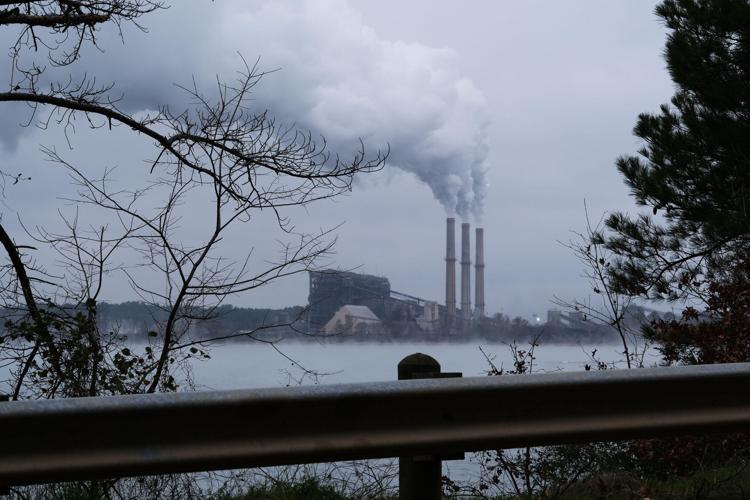The U.S. Fifth Circuit Court of Appeals decided Thursday to uphold the U.S. Environmental Protection Agency’s designation that two rural Texas counties do not meet national air quality standards for harmful sulfur dioxide.
The Texas government and coal plant owner Luminant Generation Co. had argued that the air quality in Rusk and Panola counties was not bad enough to warrant such a “nonattainment” designation from EPA, but the Fifth Circuit upheld the EPA’s determination.
The decision came after the group filed suit against the EPA in early 2023, stating that the EPA had failed to hold the Martin Lake Coal Plant to regulations required of them by the Clean Air Act.
Vistra Energy, Luminant’s parent company, put out a statement at the time saying that there was a plan in place that had resulted in lower sulfur dioxide measurements reported by the plant.
“The Fifth Circuit decision is welcome news because it cements EPA’s obligation to impose permanent and enforceable emission reductions at the Martin Lake coal plant — the biggest sulfur dioxide polluter in the entire U.S.,” said Josh Smith, a Sierra Club attorney who helped lead the case. “This will help ensure that the communities surrounding the coal plant can soon enjoy lower levels of pollution and come into attainment with national air quality standards.”
The decision now requires the Martin Lake coal plant to reduce sulfur dioxide air pollution levels.
“This decision confirms that sulfur dioxide pollution from the Martin Lake plant exceeds national air quality standards,” said Lisa Perfetto, senior attorney at Earthjustice. “Pursuant to a settlement agreement, EPA has until the end of this year to issue a federal plan or approve a Texas plan to reduce pollution and bring the area surrounding the Martin Lake plant into compliance. Too long have East Texas communities been forced to breathe polluted air.”
Rusk and Panola counties are made up of rural communities and small towns, with the air found to be polluted with sulfur dioxide due to one major source: the Martin Lake coal-burning plant, which is the largest source of sulfur dioxide in the country, the Sierra Club said.
According to a 2023 Sierra Club report, an estimated 154 people die prematurely every year due to Martin Lake’s pollution, which in 2019 amounted to 47,000 tons of sulfur dioxide. Another recent study estimates that 4,100 people have died from Martin Lake pollution since 1999.
Sulfur dioxide can cause respiratory problems, which children are especially sensitive to, and it also helps form particulate matter pollution that can enter the bloodstream and cause heart attacks.
The EPA made its original Rusk and Panola nonattainment designation for the 2010 sulfur dioxide National Ambient Air Quality Standards based on data supplied by the Sierra Club. According to Smith, numerous modeling analyses conducted using Martin Lake’s own data demonstrated that the plant’s pollution causes unhealthy air, contributing to respiratory and cardiovascular illness throughout the East Texas region. Texas’s own recent monitoring data now confirms these violations.
“The people of East Texas want and deserve clean air,” said Misti O’Quinn, a Sierra Club field organizer in Dallas and East Texas. “We are all celebrating this decision because it will finally require Luminant, which has the money to install and use this pollution-reducing technology, to actually do so. It will level the playing field — it’s what we’ve been working so hard to achieve.”
In a separate case, Sierra Club has negotiated a settlement with EPA requiring the agency to either issue a federal plan or approve a Texas plan by the end of 2024 that will lay out how the counties will achieve reduced pollution and how the Martin Lake plant will bring down emissions. The Fifth Circuit opinion was necessary to affirm this settlement and a requirement for EPA’s authority to issue a federal clean-up plan. Sierra Club expects the court in this case to issue a final approval of the settlement in the coming months.
“This court decision gives me hope,” said Paulette Goree, a lifelong Tatum-area resident who lives about two miles from the Martin Lake coal plant. “Despite living in this small town, I developed asthma later in life, my father had respiratory issues, and I lost my sister to a chronic lung disease. Now I check my personal air monitor every day to decide how much time I should spend outside. The journey to get this good news has taken a long time, but it’s not been for nothing. The decision gives the next generation of East Texans a chance to live healthier lives and breathe cleaner air.”







